Don't wanna be here? Send us removal request.
Text
The Importance of Liquid Filling Machines in the Pharmaceutical Industry
The Importance of Liquid Filling Machines in the Pharmaceutical Industry
In the pharmaceutical industry, maintaining high standards of precision, hygiene, and efficiency is not just important—it is essential. Liquid filling machines From drug formulation to packaging, every stage of production is closely monitored to ensure product quality and patient safety. Among these critical stages, the liquid filling process holds particular significance, especially for liquid medications such as syrups, injectable drugs, eye drops, and oral suspensions.
Liquid filling machines are at the heart of this process. These advanced machines ensure accurate dosage, consistent output, and contamination-free packaging, playing a key role in upholding the integrity and reliability of pharmaceutical products.

Why Liquid Filling Machines Matter
Accuracy and Consistency
Pharmaceutical products must be dispensed with extreme accuracy. Overfilling or underfilling can compromise dosage, reduce efficacy, and in some cases, pose serious health risks. Liquid filling machines are engineered with precision nozzles, liquid filling machines manufacturer volumetric controls, and automation features that ensure each container receives the exact volume of medication required. This level of consistency is difficult to achieve manually, especially in large-scale production.
Enhanced Efficiency and Speed
Manual filling processes are time-consuming, labor-intensive, and prone to error. Liquid filling machines automate the entire process, allowing for high-speed production while minimizing waste. From small batch sizes to mass production runs, these machines can handle varying volumes with ease and reliability, significantly increasing operational efficiency.
Hygienic and Contamination-Free
In pharmaceutical manufacturing, hygiene is non-negotiable. Liquid filling machines are designed using stainless steel and other GMP-compliant materials that meet stringent sanitary standards. They are easy to clean, often equipped with CIP (Clean-in-Place) systems, and operate in enclosed environments to minimize the risk of contamination.
Flexibility for Different Products and Containers
Modern liquid filling machines are highly versatile. They can accommodate various container types—glass vials, plastic bottles, ampoules—and adapt to different viscosities and compositions of liquids. Whether it's a water-like oral solution or a thicker suspension, the machine settings can be adjusted to suit the specific product requirements.
Types of Liquid Filling Machines Used in Pharmaceuticals
Volumetric Filling Machines: Use pistons or pumps to measure and dispense exact volumes of liquid.
Peristaltic Pump Fillers: Ideal for sterile and sensitive products; they prevent contamination as the liquid only contacts the tubing.
Gravity Fillers: Best for low-viscosity fluids, these machines rely on gravity for the filling process.
Vacuum Fillers: Useful for thick liquids or when precise fill levels are required.
Aseptic Filling Machines: Used for sterile liquid products that must remain contamination-free throughout the process.
Compliance and Regulatory Requirements
Pharmaceutical liquid filling operations must adhere to strict regulatory guidelines set by bodies like the FDA, WHO, and GMP (Good Manufacturing Practices). Liquid filling machines help manufacturers comply with these regulations through:
Batch traceability
Validation and documentation features
Cleanroom-compatible designs
Automated controls that reduce human error
The Role of Automation and Industry 4.0
With the rise of Industry 4.0, pharmaceutical manufacturers are adopting smart technologies for greater control, monitoring, and data analysis. Many modern liquid filling machines now come with features such as:
Touchscreen HMIs for easy operation
Real-time performance monitoring
Remote diagnostics
Integration with ERP and MES systems
This level of automation enhances quality assurance and supports data-driven decision-making, which is becoming increasingly vital in the pharmaceutical landscape.
Conclusion
Liquid filling machines are more than just a component of the pharmaceutical production line—they are essential tools that uphold the quality, safety, and efficiency of drug manufacturing. As the industry continues to evolve with higher demands and stricter regulations, investing in advanced, reliable, and flexible liquid filling equipment is crucial.
By embracing precision machinery like liquid filling machines, pharmaceutical companies can ensure accurate dosing, maintain sterile environments, and meet global standards—all while increasing productivity and reducing costs. In short, these machines are indispensable in delivering safe and effective medications to patients worldwide.
0 notes
Text
What You Need to Know Before Buying a Liquid Filler
The Essential Role of Liquid Filling Machines in the Pharmaceutical Industry
In the pharmaceutical industry, precision, hygiene, and efficiency are not just desired—they are mandatory. Every stage of pharmaceutical production is held to the highest standards to ensure product quality, patient safety, and regulatory compliance. Among these stages, the filling process—particularly for liquid medications—is one of the most critical. This is where Liquid filling machines come into play.

What Are Liquid Filling Machines?
Liquid filling machines are specialized equipment designed to accurately dispense and fill various types of liquid products into containers such as vials, bottles, ampoules, and syringes. These machines are engineered to handle a wide range of viscosities, volumes, and formulations, making them ideal for pharmaceutical applications.
Why Liquid Filling Machines Are Crucial in Pharmaceutical Manufacturing
1. Precision and Accuracy
In pharmaceuticals, even a slight variation in dosage can lead to serious consequences. Liquid filling machines ensure highly accurate and repeatable fills, reducing the risk of underfilling or overfilling. Modern machines use technologies such as servo-driven pistons, peristaltic pumps, and volumetric or gravimetric controls to deliver precise results every time.
2. Enhanced Efficiency
Manual filling is time-consuming and prone to error. Liquid filling machines significantly increase production speed and throughput, making them essential for large-scale pharmaceutical manufacturing. liquid filling machines manufacturer High-speed models can fill hundreds or even thousands of containers per hour, boosting productivity without compromising on quality.
3. Hygiene and Contamination Control
Maintaining sterility is paramount in pharmaceutical production. Liquid filling machines are often built to comply with GMP (Good Manufacturing Practices) and are designed for cleanroom environments. They feature clean-in-place (CIP) and sterilize-in-place (SIP) systems, ensuring that the product remains uncontaminated throughout the process.
4. Versatility and Customization
Pharmaceutical companies manufacture a wide variety of liquid products, from oral syrups to injectables. Liquid filling machines can be customized to handle different container types, fill volumes, and product viscosities. Some advanced systems also integrate capping, labeling, and inspection, providing a complete packaging solution.
5. Regulatory Compliance
Liquid filling systems are designed to meet stringent regulatory standards set by agencies like the FDA, EMA, and WHO. Accurate documentation, batch tracking, and integration with quality management systems ensure that the production process remains transparent and auditable.
Types of Liquid Filling Machines Used in Pharmaceuticals
Volumetric Fillers – Dispense a fixed volume of liquid using pistons or rotary pumps.
Peristaltic Pump Fillers – Ideal for sterile or sensitive liquids; easy to clean and maintain.
Vacuum Fillers – Suited for low-viscosity liquids; often used in bottling.
Time-Pressure Fillers – Use consistent pressure and time intervals to fill containers.
Aseptic Fillers – Specialized machines designed for sterile filling of injectables and biologics.
Key Features to Look for in a Pharmaceutical Liquid Filling Machine
High filling accuracy
Cleanroom compatibility
Ease of cleaning and sterilization
Scalability and modular design
User-friendly interface and automation
Validation and compliance documentation
Future Trends in Liquid Filling Technology
With the growing demand for personalized medicine, biologics, and sterile drug delivery systems, the need for advanced liquid filling solutions is increasing. Future machines will likely feature AI-driven quality checks, IoT integration for real-time monitoring, and greater automation, allowing for smart manufacturing with minimal human intervention.
Conclusion
In pharmaceutical manufacturing, the importance of a reliable and accurate liquid filling machine cannot be overstated. It is the cornerstone of safe, efficient, and compliant production processes for liquid medications. Investing in the right liquid filling system not only enhances operational efficiency but also ensures patient safety and regulatory approval.
As the industry continues to evolve, liquid filling technology will remain a critical component in delivering high-quality pharmaceutical products to the global market.
0 notes
Text
The Importance of Liquid Filling Machines in the Pharmaceutical Industry
The Role of Liquid Filling Machines in Pharmaceutical Manufacturing
Liquid filling machines are used extensively in the pharmaceutical sector due to their ability to handle delicate and precise tasks with ease. Liquid filling machines Whether it’s filling small vials, large bottles, or ampoules, these machines ensure that each unit receives the correct dosage without contamination or spillage.
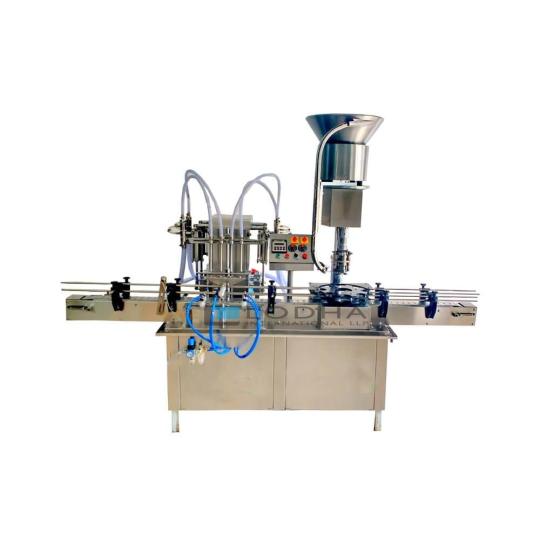
Key Benefits of Liquid Filling Machines
1. Precision and Accuracy
One of the most vital requirements in pharmaceuticals is accurate dosing. Liquid filling machines are engineered with advanced technology to deliver exact liquid filling machines manufacturer quantities of liquid into each container, minimizing dosage variations and reducing product wastage.
2. Consistency and Speed
Manual filling is not only time-consuming but also prone to human error. Automated liquid filling machines increase production speed while maintaining a high level of consistency — a crucial factor in large-scale pharmaceutical manufacturing.
3. Hygienic and Sterile Operation
Cleanroom compatibility, CIP/SIP systems (Clean-In-Place/Sterilize-In-Place), and use of stainless steel components make liquid filling machines ideal for maintaining the strict hygiene standards required in pharmaceutical facilities.

4. Versatility
Modern liquid filling machines can handle a wide range of viscosities, from water-thin liquids to thicker syrups, and are suitable for various container types and sizes. This versatility makes them a valuable asset for manufacturers with diverse product lines.
5. Compliance with Regulatory Standards
Liquid filling machines are built to comply with Good Manufacturing Practices (GMP), FDA regulations, and other industry-specific standards. This ensures that pharmaceutical products are produced under safe, validated, and repeatable conditions.
Types of Liquid Filling Machines Used in Pharmaceuticals
Volumetric Filling Machines – Ideal for highly accurate volume-based filling.
Peristaltic Pump Fillers – Great for sterile or sensitive products with minimal product contact.
Gravity Fillers – Suitable for thin, free-flowing liquids.
Piston Fillers – Used for viscous products like syrups or gels.
Conclusion: The Future of Liquid Filling in Pharma
As the demand for liquid pharmaceutical products continues to grow, so does the need for advanced liquid filling machines that can meet high-volume production goals while ensuring accuracy and cleanliness. These machines are not just equipment — they are vital components of a safe and efficient pharmaceutical production line.
With innovations in automation, robotics, and smart sensors, the future of liquid filling in the pharmaceutical industry promises even greater levels of control, efficiency, and compliance.
Investing in the right liquid filling machine today means safeguarding the quality and reliability of pharmaceutical products for tomorrow.
0 notes
Text
Is Your Liquid Filler Messing Up Quick Fixes Now
The Importance of Liquid Filling Machines in the Pharmaceutical Industry
In the pharmaceutical industry, precision and efficiency are essential to ensuring product quality and safety. One of the most critical aspects of pharmaceutical production is the filling process, particularly when it comes to liquid medications. Liquid filling machines Liquid filling machines play a crucial role in this process, providing accurate, consistent, and hygienic filling solutions for a wide range of liquid products.

The Role of Liquid Filling Machines
Liquid filling machines are designed to handle various types of liquid medications, including syrups, suspensions, injectable solutions, and other pharmaceutical formulations. These machines ensure that each container is filled with the exact dosage required, reducing the risk of inconsistencies and contamination. liquid filling machines manufacturer By automating the filling process, pharmaceutical manufacturers can improve productivity while maintaining stringent quality control standards.
Benefits of Using Liquid Filling Machines
Precision and Accuracy: Modern liquid filling machines use advanced technologies such as volumetric filling, peristaltic pumps, and piston-based systems to ensure accurate dosage delivery, minimizing wastage and ensuring compliance with regulatory standards.
Efficiency and Productivity: Automated filling machines significantly enhance production efficiency by reducing manual labor and increasing output rates. This leads to faster turnaround times and greater consistency in production.
Hygiene and Contamination Control: Pharmaceutical liquid filling machines are designed with sanitary materials, such as stainless steel, and feature closed filling systems to prevent contamination and maintain product integrity.
Versatility: These machines can handle a wide range of liquid viscosities and container types, including bottles, vials, ampoules, and syringes, making them adaptable to different pharmaceutical applications.
Regulatory Compliance: Pharmaceutical manufacturing is subject to stringent regulatory requirements, such as Good Manufacturing Practices (GMP) and FDA guidelines. Liquid filling machines help manufacturers meet these standards by ensuring precision, consistency, and traceability in the filling process.

Types of Liquid Filling Machines
Overflow Fillers: Ideal for filling transparent containers, ensuring uniform liquid levels.
Peristaltic Pump Fillers: Suitable for sterile and high-precision applications, particularly for injectables and biologics.
Piston Fillers: Best for viscous liquids, such as syrups and creams, providing high accuracy and consistency.
Vacuum Fillers: Used for filling highly volatile or foamy liquids, ensuring precise control over the filling volume.
Conclusion
Liquid filling machines are indispensable in the pharmaceutical industry, ensuring precision, efficiency, and hygiene in the production of liquid medications. As technology advances, these machines continue to evolve, offering even greater accuracy and compliance with regulatory standards. By investing in high-quality liquid filling machines, pharmaceutical companies can optimize their production processes while maintaining the highest levels of product safety and efficacy.
0 notes
Text
How to Maintain Your Liquid Filling Machine Effectively
The Importance of Liquid Filling Machines in the Pharmaceutical Industry
In the pharmaceutical industry, precision, efficiency, and hygiene are paramount to ensuring product quality and patient safety. liquid filling machines Among the many critical processes in pharmaceutical manufacturing, the filling of liquid medications stands out as a key operation. To meet stringent regulatory standards and maintain consistency, pharmaceutical companies rely on liquid filling machines for accurate, sterile, and efficient filling solutions.

The Role of Liquid Filling Machines
Liquid filling machines are specially designed to handle a wide range of liquid pharmaceuticals, including syrups, suspensions, eye drops, injectable solutions, and more. These machines oral liquid filling machines ensure that each dose is filled with precision and consistency, eliminating variations that could affect efficacy and patient safety.

Key Benefits of Liquid Filling Machines
Accuracy and Consistency Modern liquid filling machines are equipped with advanced dosing mechanisms that ensure precise volume control, reducing product waste and ensuring uniformity in every batch.
Hygiene and Contamination Control Since pharmaceutical products must adhere to strict GMP (Good Manufacturing Practice) guidelines, liquid filling machines are designed with sanitary features, such as stainless steel construction, automated cleaning systems (CIP/SIP), and contamination-free filling methods.
Increased Efficiency and Productivity Automated liquid filling systems significantly reduce manual labor, improve production speed, and ensure high throughput, making them essential for large-scale pharmaceutical manufacturing.
Versatility for Various Liquid Products These machines can handle different viscosities, from thin solutions like saline to thick syrups, making them adaptable for a diverse range of pharmaceutical formulations.
Compliance with Regulatory Standards Pharmaceutical manufacturing is governed by strict regulations, including those set by the FDA, WHO, and other health authorities. Liquid filling machines help ensure compliance by offering precise measurement, sterile operation, and minimal human intervention.
Types of Liquid Filling Machines Used in Pharmaceuticals
Volumetric Liquid Fillers – Ideal for accurately measuring and dispensing liquid based on volume.
Peristaltic Pump Fillers – Commonly used for sterile and injectable pharmaceutical liquids due to their contamination-free process.
Piston Fillers – Suitable for viscous liquids like syrups and suspensions.
Gravity Fillers – Used for thin, free-flowing liquids that require precise filling.
Conclusion
Liquid filling machines are a vital component of pharmaceutical manufacturing, ensuring precision, hygiene, and efficiency in the production of liquid medications. By integrating advanced technology and automation, these machines help pharmaceutical companies maintain high-quality standards, regulatory compliance, and operational efficiency.
As the demand for liquid pharmaceuticals continues to grow, the adoption of cutting-edge liquid filling systems will remain a cornerstone of the industry, ensuring safe and effective medication delivery to patients worldwide.
0 notes
Text
What's the Best Way to Clean Your Liquid Filling Machine
The Importance of Liquid Filling Machines in the Pharmaceutical Industry
In the pharmaceutical industry, precision, efficiency, and hygiene are paramount in ensuring product quality and patient safety. liquid filling machines One of the most crucial aspects of pharmaceutical production is the filling process, especially when dealing with liquid medications. Liquid filling machines play a vital role in this process by providing accurate, consistent, and contamination-free filling solutions for a wide range of liquid products.
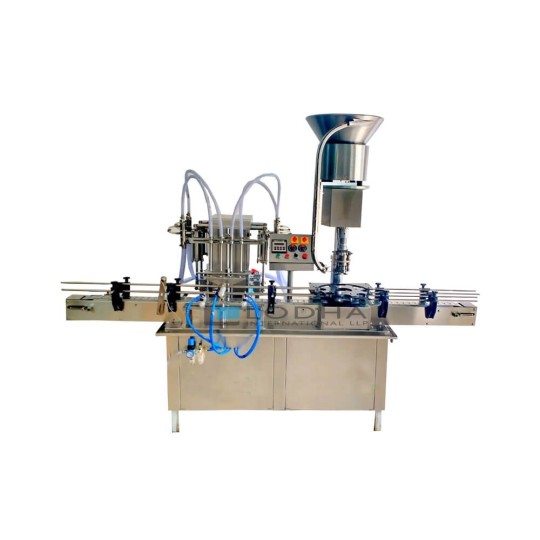
The Role of Liquid Filling Machines
Liquid filling machines are specialized equipment designed to accurately dispense liquid pharmaceutical products into various types of containers, oral liquid filling machines including bottles, vials, and ampoules. These machines are essential in maintaining uniformity, preventing contamination, and optimizing production efficiency.
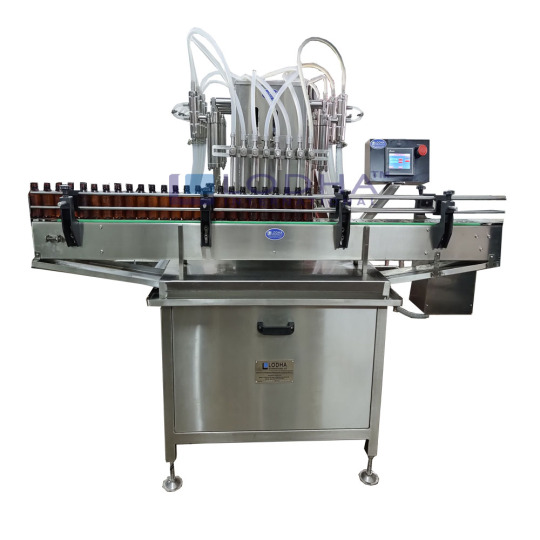
Key Benefits of Liquid Filling Machines
Precision and Accuracy: Liquid medications require exact dosage measurements to ensure their efficacy and safety. Advanced liquid filling machines use precise volumetric, peristaltic, or piston-based filling mechanisms to deliver accurate doses, reducing the risk of underfilling or overfilling.
Efficiency and Productivity: Automated liquid filling machines significantly enhance production speed by filling multiple containers simultaneously. This efficiency reduces manual labor, minimizes human errors, and increases overall output, meeting the high demand for pharmaceutical products.
Hygiene and Contamination Control: The pharmaceutical industry follows stringent hygiene standards. Liquid filling machines are designed with stainless steel components, easy-to-clean surfaces, and aseptic filling techniques to prevent microbial contamination, ensuring compliance with Good Manufacturing Practices (GMP).
Versatility: These machines can handle a variety of liquid viscosities, from thin syrups to thick suspensions, making them ideal for different pharmaceutical formulations. They can also accommodate various container sizes and shapes, offering flexibility in packaging solutions.
Regulatory Compliance: Liquid filling machines adhere to industry regulations such as FDA (Food and Drug Administration), GMP, and ISO standards. Their precise filling capabilities and sanitary design ensure that pharmaceutical products meet all required safety and quality guidelines.
Types of Liquid Filling Machines
Volumetric Liquid Fillers: Suitable for free-flowing liquids, ensuring precise volume control.
Peristaltic Pump Fillers: Ideal for sterile applications, minimizing contamination risks.
Piston Fillers: Best for handling thick or viscous liquids like suspensions and syrups.
Overflow Fillers: Used for transparent liquids where consistent fill levels are required.
Conclusion
Liquid filling machines are an indispensable part of pharmaceutical manufacturing, ensuring precision, efficiency, and hygiene in the production of liquid medications. With advancements in technology, these machines continue to improve, offering better accuracy, speed, and compliance with industry regulations. Investing in high-quality liquid filling equipment is essential for pharmaceutical companies aiming to deliver safe and effective products to the market.
By integrating the latest liquid filling solutions, the pharmaceutical industry can enhance productivity, maintain quality control, and uphold the highest safety standards, ultimately benefiting both manufacturers and consumers.
0 notes
Text
Liquid Filling Machine Maintenance Tips for Better Performance
Precision and Efficiency in Pharmaceutical Liquid Filling Machines
In the pharmaceutical industry, precision and efficiency are crucial to ensuring product quality, safety, and regulatory compliance. One of the most vital aspects of pharmaceutical manufacturing is the filling process, particularly for liquid medications. liquid filling machines play an essential role in ensuring accurate, consistent, and hygienic filling solutions for a wide range of pharmaceutical products.
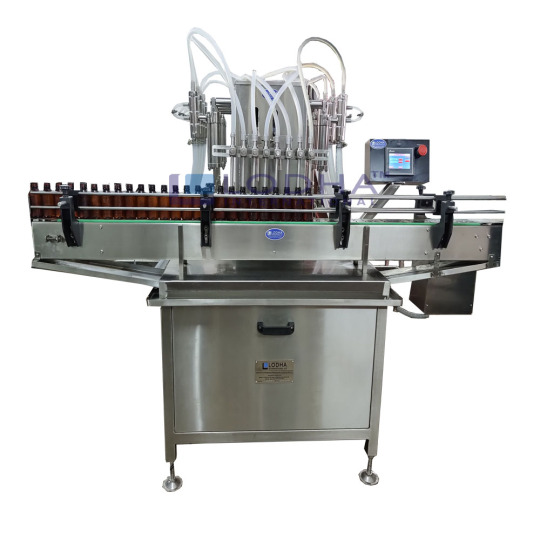
The Importance of Liquid Filling Machines in Pharmaceuticals
Liquid filling machines are designed to handle various liquid formulations, including syrups, suspensions, and solutions, with high accuracy. These machines help pharmaceutical manufacturers maintain product consistency, reduce wastage, and increase production efficiency. Moreover, oral liquid filling machines they ensure compliance with Good Manufacturing Practices (GMP) and regulatory standards set by authorities such as the FDA and WHO.
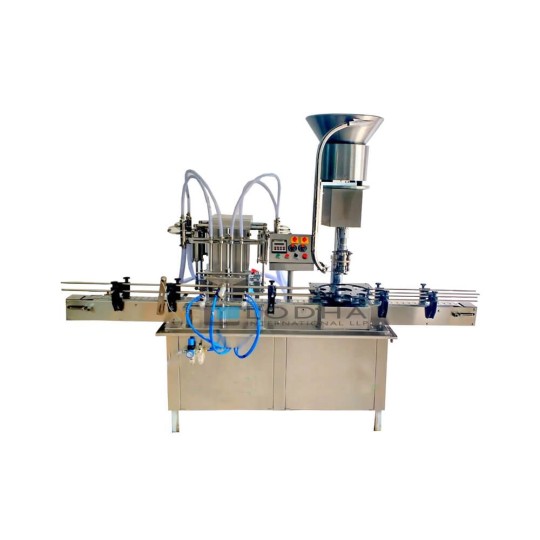
Key Benefits of Liquid Filling Machines:
Precision and Accuracy: Ensures the correct dosage in each container, minimizing errors.
Hygienic Operation: Designed to prevent contamination and maintain product integrity.
Efficiency and Speed: Capable of handling large-scale production with minimal downtime.
Flexibility: Suitable for various container sizes and liquid viscosities.
Cost-Effectiveness: Reduces product wastage and operational costs.
Specialized Oral Liquid Filling Machines by Laxmi Pharma Equipments
At Laxmi Pharma Equipments, we specialize in manufacturing high-quality oral liquid filling machines designed to meet the stringent demands of pharmaceutical production. Our machines are engineered with advanced technology to provide seamless, reliable, and efficient filling operations for oral medications such as syrups, suspensions, and elixirs.
Features of Our Oral Liquid Filling Machines:
Automatic and Semi-Automatic Models: Offering both fully automated and semi-automated options to cater to different production scales.
High Filling Accuracy: Equipped with precision nozzles and advanced control systems to ensure exact volume filling.
CIP & SIP Systems: Integrated Clean-in-Place (CIP) and Sterilization-in-Place (SIP) functionalities for optimal hygiene.
Customizable Solutions: Tailored configurations to suit specific pharmaceutical production needs.
User-Friendly Interface: Intuitive controls and touch-screen panels for easy operation and monitoring.
Why Choose Laxmi Pharma Equipments?
Industry Expertise: Years of experience in designing and manufacturing pharmaceutical machinery.
Compliance with International Standards: Our machines comply with GMP, FDA, and ISO certifications.
Cutting-Edge Technology: Utilization of the latest innovations for superior performance.
Dedicated Customer Support: Comprehensive after-sales service and technical assistance.
Conclusion
For pharmaceutical manufacturers, investing in high-quality liquid filling machines is essential to ensure precision, efficiency, and compliance in production. At Laxmi Pharma Equipments, we provide state-of-the-art oral liquid filling machines tailored to meet the highest industry standards. Our solutions are designed to optimize production processes, reduce costs, and enhance overall operational efficiency.
If you are looking for reliable and high-performance pharmaceutical filling machines, contact Laxmi Pharma Equipments today and take your production efficiency to the next level!
0 notes
Text
Choosing the Right Liquid Filling Machine for Your Business
Ensuring Precision and Safety: The Role of Filling Processes in the Pharmaceutical Industry
In the pharmaceutical industry, precision, hygiene, and efficiency are non-negotiable aspects that directly impact product quality and patient safety. Among the many critical processes involved in the production of pharmaceutical products, the filling process stands out as one of the most essential. Whether it’s oral syrups, vaccines, or other liquid formulations,liquid filling machines ensuring accurate and hygienic filling is vital to maintaining product integrity and meeting stringent regulatory standards.
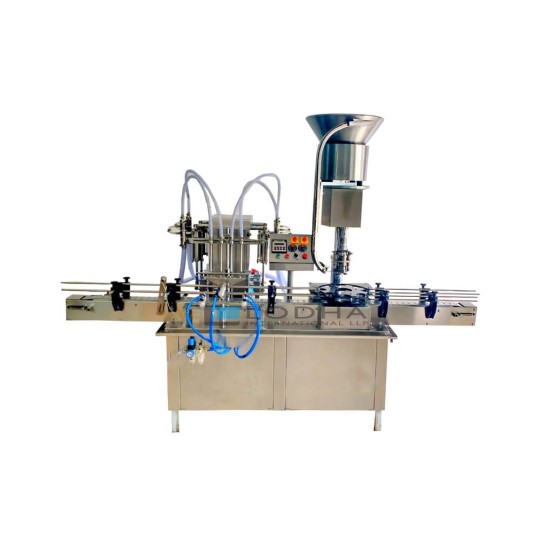
The Importance of the Filling Process
The filling process in pharmaceutical manufacturing involves transferring liquid or semi-liquid formulations into containers such as vials, bottles, ampoules, or prefilled syringes.oral liquid filling machines This step is crucial for several reasons:
Maintaining Dosage Accuracy: Precision in filling ensures that each unit contains the exact dosage as specified. Even minor deviations can compromise the efficacy of the medication or pose risks to patients.
Preventing Contamination: Hygiene during the filling process is paramount to avoid microbial contamination, which can render medications unsafe for use.
Enhancing Efficiency: A well-optimized filling process reduces waste, speeds up production, and minimizes downtime, ultimately ensuring timely delivery of medications to the market.
Regulatory Compliance: Stringent standards set by regulatory authorities, such as the FDA and WHO, mandate rigorous adherence to quality protocols during filling. Non-compliance can result in product recalls and significant financial losses.
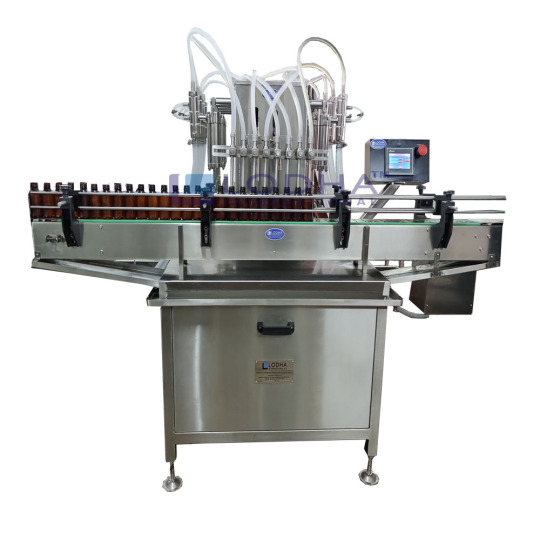
Key Technologies in Pharmaceutical Filling
Advancements in technology have revolutionized the pharmaceutical filling process, making it more precise and efficient. Some key technologies include:
Automated Filling Machines: These machines use robotics and advanced sensors to achieve high-speed, accurate filling with minimal human intervention, reducing the risk of errors and contamination.
Aseptic Filling Systems: Designed for sterile environments, these systems ensure that products, especially vaccines and injectable drugs, are filled without exposure to contaminants.
Peristaltic Pumps: Frequently used in liquid filling, peristaltic pumps provide precise control over flow rates, ensuring consistent volume in each container.
In-Line Quality Control: Modern filling lines are equipped with inspection systems to detect and reject units that fail to meet quality standards, such as underfilled or overfilled containers.
Challenges in the Filling Process
Despite technological advancements, the pharmaceutical filling process faces several challenges:
Product Sensitivity: Some formulations are highly sensitive to environmental factors, requiring specialized equipment to maintain stability during filling.
High Production Demand: Increasing global demand for pharmaceutical products places pressure on manufacturers to optimize filling lines without compromising quality.
Regulatory Scrutiny: With evolving regulations, manufacturers must continuously update processes to remain compliant.
Equipment Maintenance: Downtime due to equipment failure or maintenance can disrupt production schedules and increase costs.
Best Practices for Efficient and Hygienic Filling
To overcome these challenges and ensure optimal performance, pharmaceutical companies should adopt the following best practices:
Implement Robust Training Programs: Equip personnel with the skills needed to operate and maintain filling equipment effectively.
Regular Equipment Calibration: Routine calibration and maintenance of filling machines ensure consistent performance and reduce the risk of errors.
Invest in Advanced Technologies: Embracing innovations such as AI-powered quality control systems can enhance precision and efficiency.
Maintain a Sterile Environment: Adhering to Good Manufacturing Practices (GMP) and maintaining cleanroom standards are critical for contamination-free filling.
Perform Routine Audits: Regular internal and external audits help identify potential gaps in processes and ensure compliance with regulatory standards.
Conclusion
The filling process is a cornerstone of pharmaceutical manufacturing, directly impacting the quality, safety, and efficacy of medications. By prioritizing precision, hygiene, and efficiency, manufacturers can meet the growing demands of the healthcare industry while ensuring compliance with regulatory standards. As technology continues to evolve, the pharmaceutical industry must remain committed to adopting innovative solutions that enhance the filling process, ultimately safeguarding patient health and well-being.
1 note
·
View note